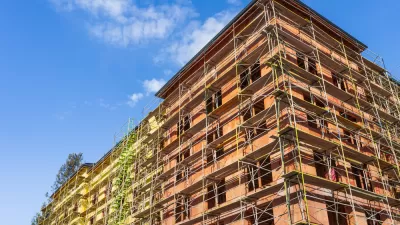UBC's Patrick Condon argues that for Vancouver and cities like it, simply adding supply at any level doesn't get at the root causes of the global affordable housing crisis.

The Planning Report interviews Patrick Condon, chair of Urban Design at the University of British Columbia, about the factors that led Vancouver to launch its recent housing policy "reset"—a shift away from encouraging all types of housing to investing in the preservation of affordable housing. At first, Condon says, the city facilitated plenty of development "based on the assumption that any supply is good supply" because even high-end housing would improve affordability. But over time:
It became increasingly obvious that adding supply in this way was not reducing, but actually increasing, the cost of housing. Adding supply at the high end had the nefarious consequence of increasing the apparent investment value of real estate throughout the entire city. It not only created supply that was unaffordable to the people who live here, but also had the perverse effect of raising the cost of all housing throughout the city.
Now, the city is pursuing a set of strategies whose goal is to devalue land—"because in reality, we don’t have a high-cost housing problem. We have a high-cost buildable land problem," Condon says. The new 10-year plan also encourages transit-oriented development, streamlines development permits, and preserves existing affordable housing, while targeting investment in new supply to housing for average incomes.
For Condon, these are first steps that can help alleviate the stress caused by a deeper, more pervasive problem: a global real estate environment that has rendered housing a commodity. "The fundamental problem is that there is a flow of money away from the middle class toward the investor class, and that is not a problem that purely housing-oriented strategies are going to solve," he says.
Condon is the first to note that his research has met a cooler reception in Vancouver than in neighboring cities. Planetizen blogger Michael Llewyn has offered contrasting perspectives on the roots of Vancouver's housing problem and possible solutions.
FULL STORY: Learning from Vancouver: Housing Affordability & the Myth of Supply-Side Densification

Alabama: Trump Terminates Settlements for Black Communities Harmed By Raw Sewage
Trump deemed the landmark civil rights agreement “illegal DEI and environmental justice policy.”

Study: Maui’s Plan to Convert Vacation Rentals to Long-Term Housing Could Cause Nearly $1 Billion Economic Loss
The plan would reduce visitor accommodation by 25% resulting in 1,900 jobs lost.

Planetizen Federal Action Tracker
A weekly monitor of how Trump’s orders and actions are impacting planners and planning in America.

Wind Energy on the Rise Despite Federal Policy Reversal
The Trump administration is revoking federal support for renewable energy, but demand for new projects continues unabated.

Passengers Flock to Caltrain After Electrification
The new electric trains are running faster and more reliably, leading to strong ridership growth on the Bay Area rail system.

Texas Churches Rally Behind ‘Yes in God’s Back Yard’ Legislation
Religious leaders want the state to reduce zoning regulations to streamline leasing church-owned land to housing developers.
Urban Design for Planners 1: Software Tools
This six-course series explores essential urban design concepts using open source software and equips planners with the tools they need to participate fully in the urban design process.
Planning for Universal Design
Learn the tools for implementing Universal Design in planning regulations.
Caltrans
Smith Gee Studio
Institute for Housing and Urban Development Studies (IHS)
City of Grandview
Harvard GSD Executive Education
Toledo-Lucas County Plan Commissions
Salt Lake City
NYU Wagner Graduate School of Public Service





























